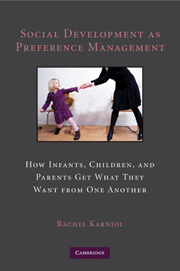 Social Development as Preference Management
Social Development as Preference Management Book contents
- Frontmatter
- Contents
- Acknowledgments
- Introduction
- 1 The Baby “Preference Game”
- 2 Children's Expression of Preferences
- 3 Emerging Meta-Preferences
- 4 Other People's Preferences
- 5 Parenting and Preference Management
- 6 Channeling Children's Preferences
- 7 Temporizing Preferences
- 8 Restricting Children's Preferences
- 9 Disciplining Noncompliance
- 10 Planes of Transformational Thought: Temporal, Imaginal, and Mental
- 11 Manipulating Others
- 12 Coping and Self-Regulating
- 13 Mind Play: Applying Transformational Thought
- 14 Minding One's Own Versus Others' Preferences: Altruism, Aggression, and Morality
- 15 Tying Up
- References
- Subject Index
- Name Index
7 - Temporizing Preferences
Published online by Cambridge University Press: 05 June 2012
- Frontmatter
- Contents
- Acknowledgments
- Introduction
- 1 The Baby “Preference Game”
- 2 Children's Expression of Preferences
- 3 Emerging Meta-Preferences
- 4 Other People's Preferences
- 5 Parenting and Preference Management
- 6 Channeling Children's Preferences
- 7 Temporizing Preferences
- 8 Restricting Children's Preferences
- 9 Disciplining Noncompliance
- 10 Planes of Transformational Thought: Temporal, Imaginal, and Mental
- 11 Manipulating Others
- 12 Coping and Self-Regulating
- 13 Mind Play: Applying Transformational Thought
- 14 Minding One's Own Versus Others' Preferences: Altruism, Aggression, and Morality
- 15 Tying Up
- References
- Subject Index
- Name Index
Summary
At 34 months, Allison is playing with her mother, who says, ‘So we can play now and have a snack or do anything you want now.’ Allison answers, ‘Not now, maybe later.’ The mother answers, ‘Maybe now, I'd kind of like a snack.’ Allison answers her, ‘No maybe later and I may eat a cookie up first.’ When a few minutes later her mother offers her raisins, she refuses them, saying, ‘I don't want my raisin snack.’
(Bloom, 1970)Two children of 3;6 years are playing house. The boy says, ‘Let's go to bed honey, let's go to bed.’ When she answers, ‘No, I'm playing with these animals…. The animals are going to bed….’; he insists, ‘Honey, it's nighttime let's go to bed.’
(Cook-Gumperz, 1986, p. 57)Learning about the temporal dimension and how to use it relative to one's own and other people's preferences is a critical aspect of social life. Parents’ external preferences often concern when their children should, or should not, engage in given behaviors. Hence, they temporize their children's preferences – pivoting them around the temporal dimension, teaching them how to allocate time by telling them when and for how long behaviors are to be engaged in and what should be done now versus later. That is, parental external preferences and children's own preferences may clash with respect to when, but not as to whether, they should be engaged in. When parents temporize, they imply that there are times at which the specified activities are acceptable and that they are not precluding the future availability of the objects or activities in question.
- Type
- Chapter
- Information
- Social Development as Preference ManagementHow Infants, Children, and Parents Get What They Want from One Another, pp. 129 - 148Publisher: Cambridge University PressPrint publication year: 2010


